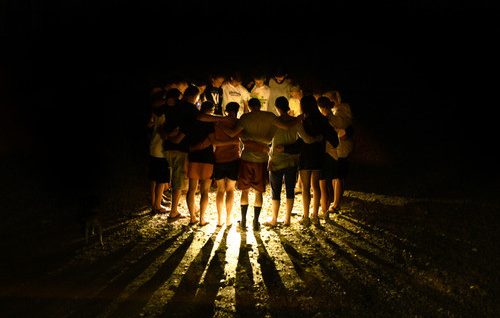Throughout history, there have been many separatist groups of Christians, coming from diverse backgrounds, operating in different environments, and struggling with different problems. About one hundred years ago, many groups were involved in a struggle against Modernism, which was rejecting: (1) the inerrancy of the Bible; (2) the virgin birth of Jesus Christ; (3) Christ’s atonement for sin; (4) Jesus’ resurrection from the dead; and (5) the millennial return of Christ; and replacing it with so-called science, psychiatry, and self-worship.
But many also realized that this optimism in Modernism was misplaced if it ignored the most basic fundamental truths of the Gospel, such as mankind’s need for redemption from sin.
Out of this struggle arose groups who were prepared “to do battle royal for the fundamentals of the faith.” Around 1920, these began to be described as “fundamentalists.” This term started as a derogatory label by outsiders and was adopted as a badge of honor by insiders. Eventually fundamentalism sorted itself into two camps:
- “Closed” or “Separatist” Fundamentalism
- Emphasized separation, not only from non-Christians, but also from other Christians who did not agree with them in every detail. This first camp made separation (even from orthodox fellow Christians with whom they were not in full agreement on all points) an absolute requirement for church membership.
- “Open” Fundamentalism
- Had a more positive orientation and broader vision of winning the world for Christ. The second was more inclusivist, choosing to work with groups espousing basic orthodoxy to achieve the larger evangelistic goals. This second camp went on to become the evangelicals of today.
– Halley, Henry H. (2012-08-21)
Halley’s Bible Handbook
Since this all happened in the last 100 years, some of these “closed” or “separatist” fundamentalist groups still function. They were founded on separation for what they believed were absolute fundamental true Bible doctrines. Each of these groups acted as though they had a lock on the “truth.” Some of their members even called themselves “Separated Christians.” This attitude may have led to zealotry as it has throughout history…
“Therefore, I am sending you prophets and wise men and teachers of religious law. But you will kill some by crucifixion, and you will flog others with whips in your synagogues, chasing them from city to city. As a result, you will be held responsible for the murder of all godly people of all time—from the murder of righteous Abel to the murder of Zechariah son of Barachiah, whom you killed in the Temple between the sanctuary and the altar. I tell you the truth, this judgment will fall on this very generation. (Matthew 23:34-36)
You know what I was like when I followed the Jewish religion—how I violently persecuted God’s church. I did my best to destroy it. I was far ahead of my fellow Jews in my zeal for the traditions of my ancestors.(Galatians 1:13-14)
For I am the least of all the apostles. In fact, I’m not even worthy to be called an apostle after the way I persecuted God’s church. (1 Corinthians 15:9)
If you have acted like the Apostle Paul before he was converted, or have been affected by someone else who acted that way, what is the solution? The solution is always only Jesus Christ.
For everyone has sinned; we all fall short of God’s glorious standard. Yet God, with undeserved kindness, declares that we are righteous. He did this through Christ Jesus when he freed us from the penalty for our sins. For God presented Jesus as the sacrifice for sin. People are made right with God when they believe that Jesus sacrificed his life, shedding his blood. This sacrifice shows that God was being fair when he held back and did not punish those who sinned in times past, for he was looking ahead and including them in what he would do in this present time. God did this to demonstrate his righteousness, for he himself is fair and just, and he declares sinners to be right in his sight when they believe in Jesus. (Romans 3:23-26)
Please read…
- The fear of religion is a dangerous trap
- Do you have religious trauma syndrome?
- Neither do I condemn thee
- 7 Characteristics of a Real, Genuine, Sincere Apology
- The amazing 1-step way to forgive
- What is the gospel?
If you are struggling with this concept, please write to us or join the conversation below.
